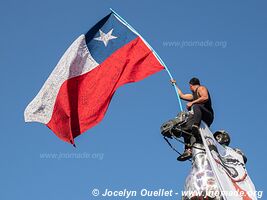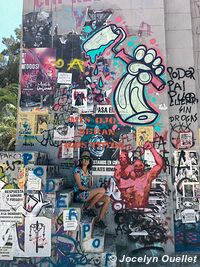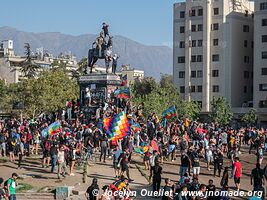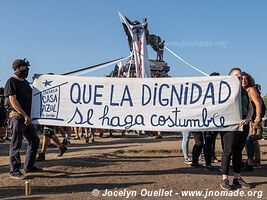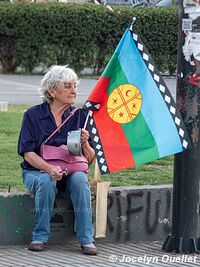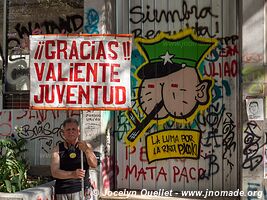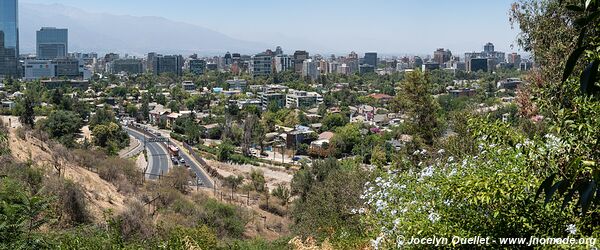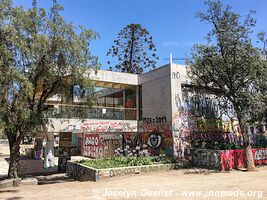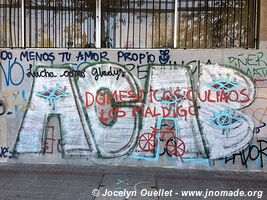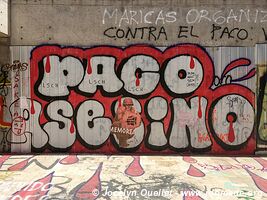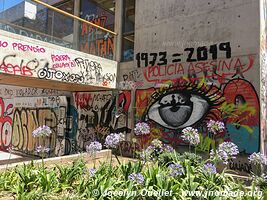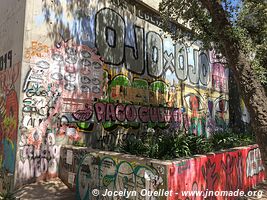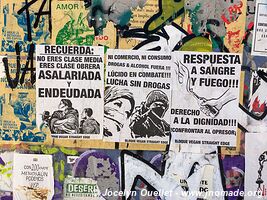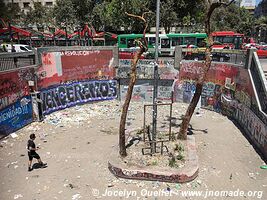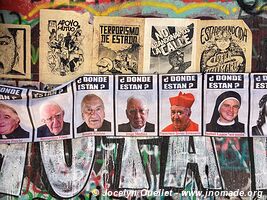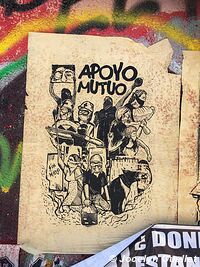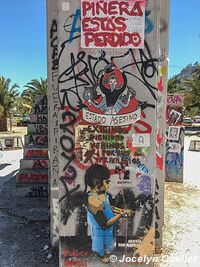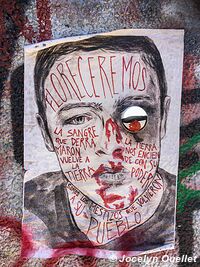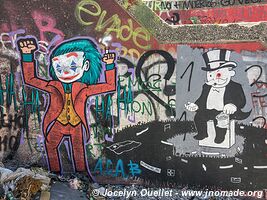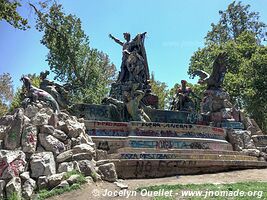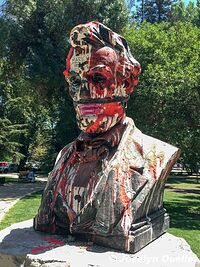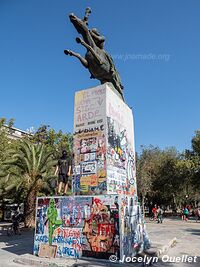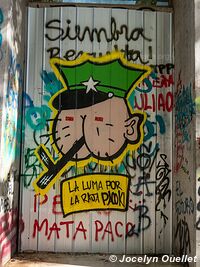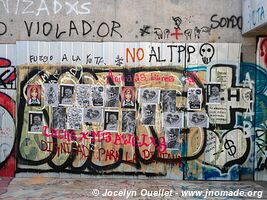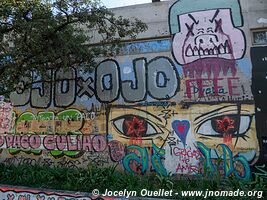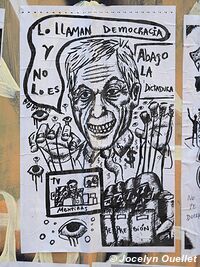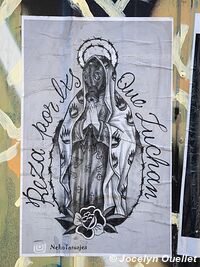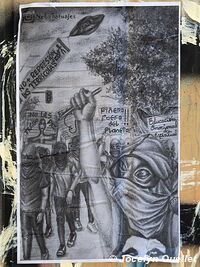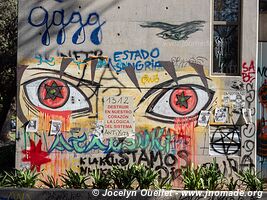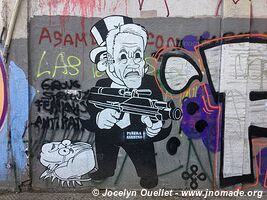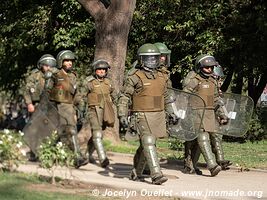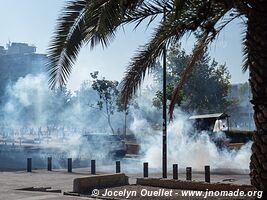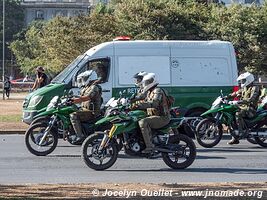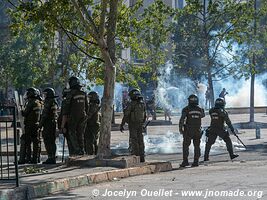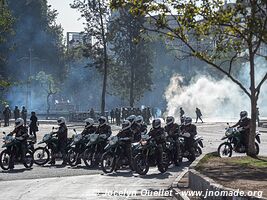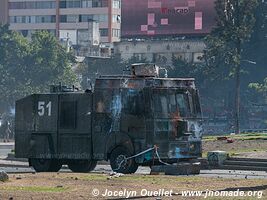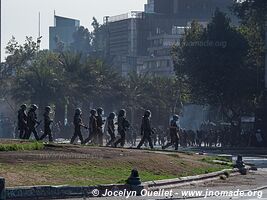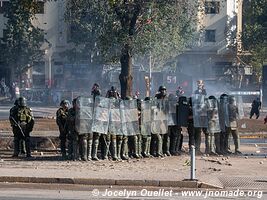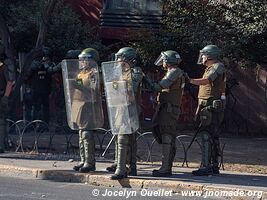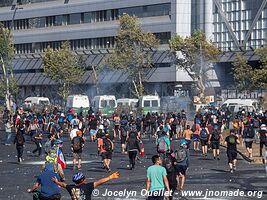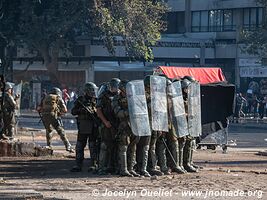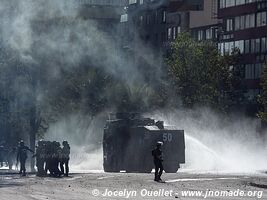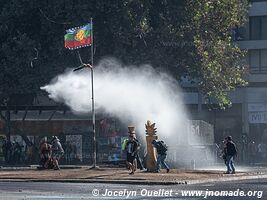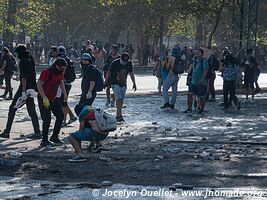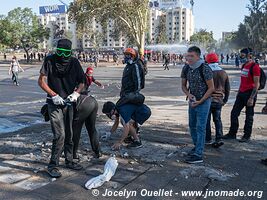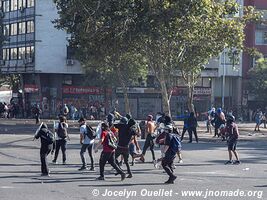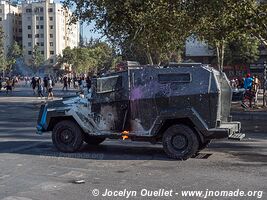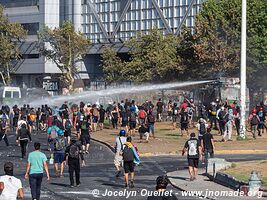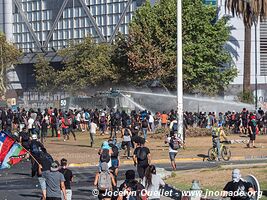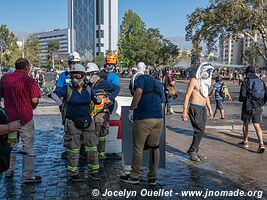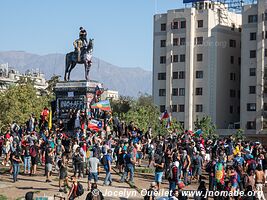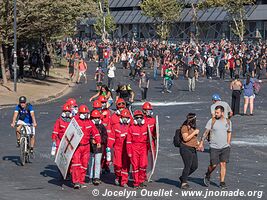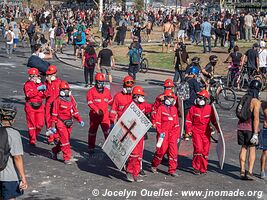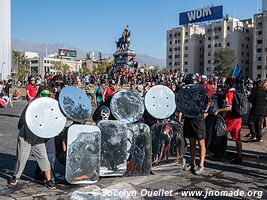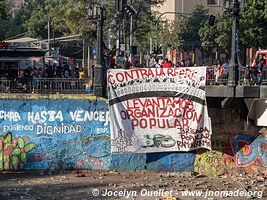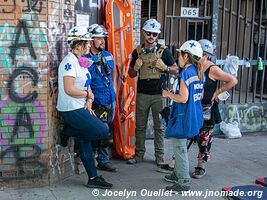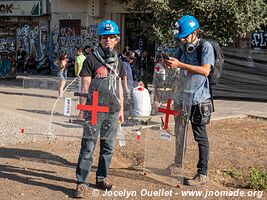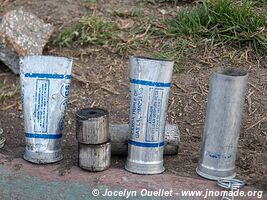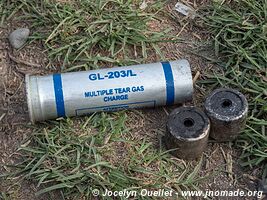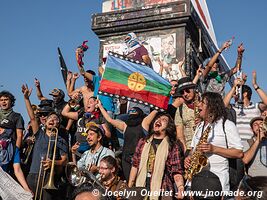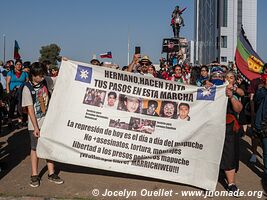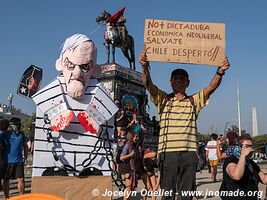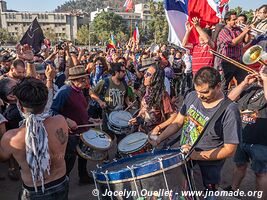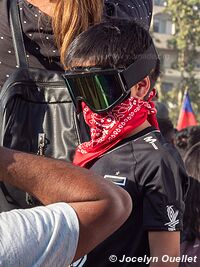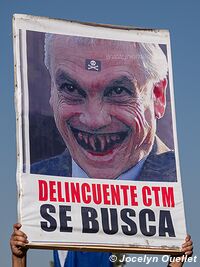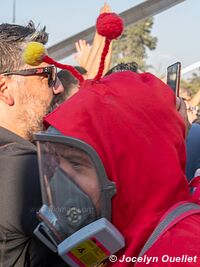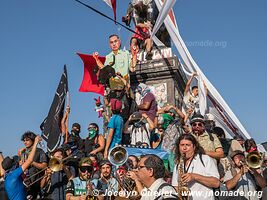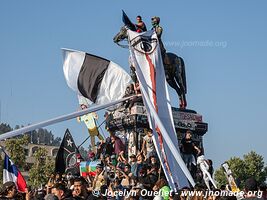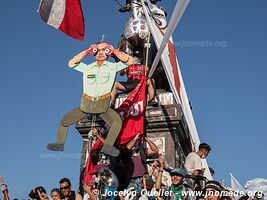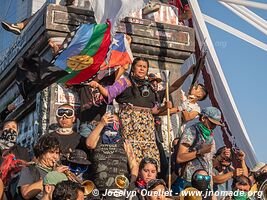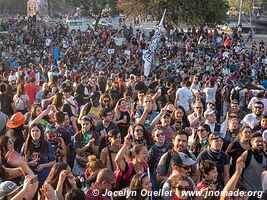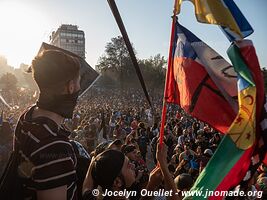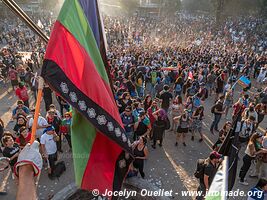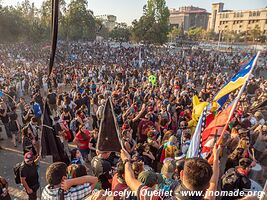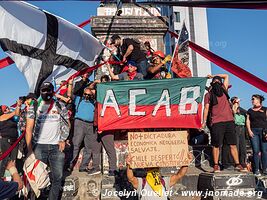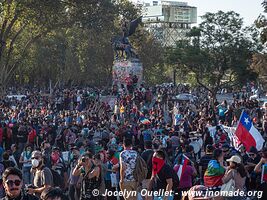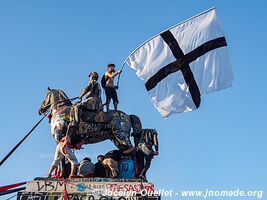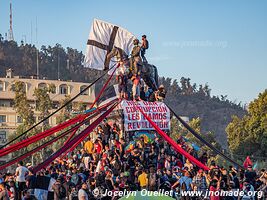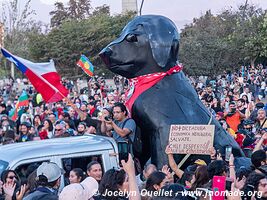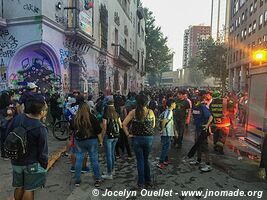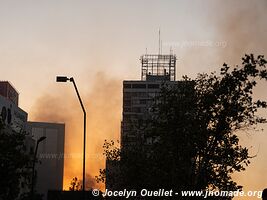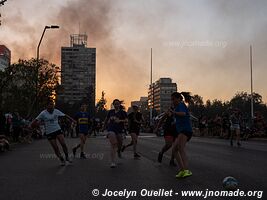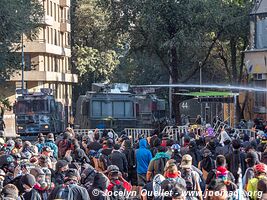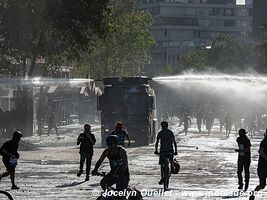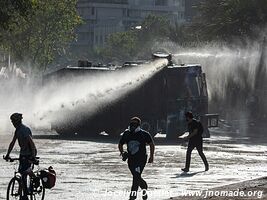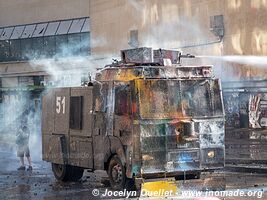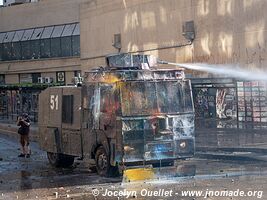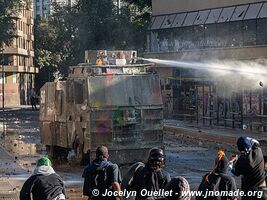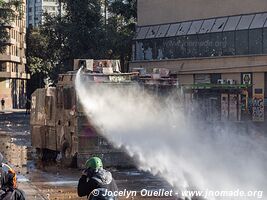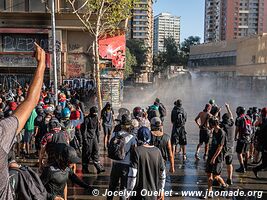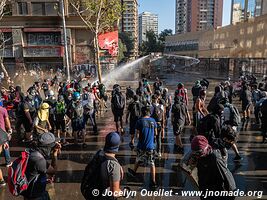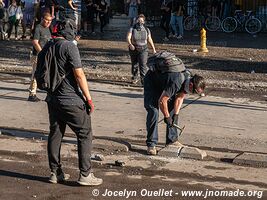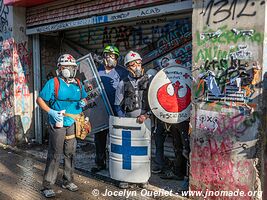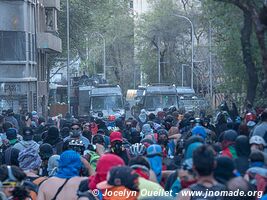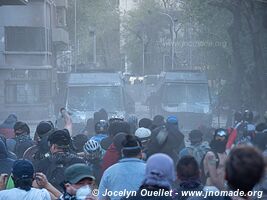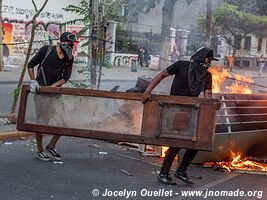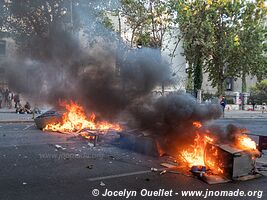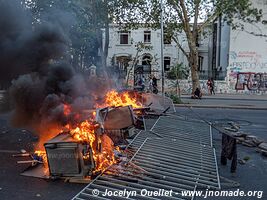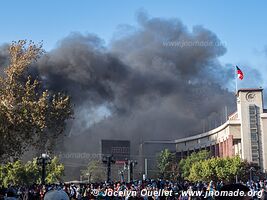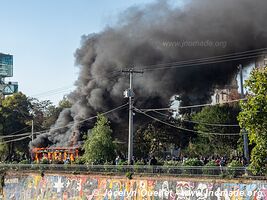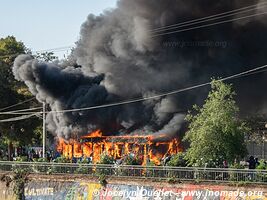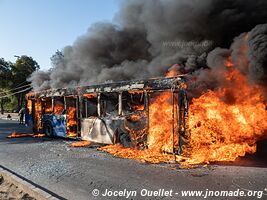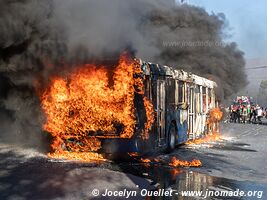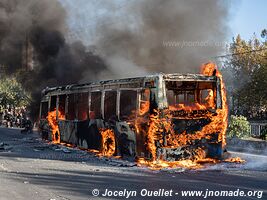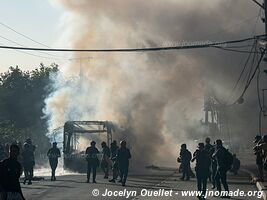Santiago de Chile
During the Christmas and New Year's holiday season, I stayed in Santiago, the capital of Chile. In fact, I stayed there almost a month to relax and essentially do nothing. I rented a house via Airbnb in the Ñuñoa suburb in the heart of the city; it is a very nice residential neighbourhood with plenty of restaurants, bars, and shopping opportunities.
I visited a few places in the city, but I especially wanted to be part of the protests and to live a new travel experience. You will notice that protests in the capital are very intense, and they can be very dangerous...
At the time of my visit, downtown Santiago has been subjected to a lot of damage due to the protests. Around the Plaza de la Dignidad, the walls have been covered in graffitis and posters, and vandalism can be seen everywhere.
The host at the house where I stayed was Mariana. It was nice to meet her, and together we went several times to restaurants and a few times to bars. She showed me some interesting places in the city as well as guide me to where the protests take place.
Note: the photos and video that follow are not all of good quality. My camera was broken and I had problems with the autofocus feature. In addition, the sound capture on the video is quite bad since the external microphone was not working either...
The Protests in Chile
The civilian protests started on October 7, 2019, after an increase in the cost of transport of the Santiago metro. The increase of 30 pesos per ticket (5 cents Canadian) is obviously not the only reason for the discontent, it was more the drop that made the cup run over. The increases in the cost of living, the privatization of services, and the inequality between the rich and the poor all contributed to the disgruntlement of the people.
After the announcement of increased cost for the metro, secondary school students started a campaign of fare evasion by refusing to pay their tickets. They jumped over the gates, and there were some spontaneous takeovers of a few metro stations that lead to open confrontations with the Carabineros de Chile (the national police force). From that moment on, the conflict quickly escalated.
On October 18th, a few groups of people started to vandalize the city's infrastructure; several metro stations were burned or damaged even causing the complete shutdown of the whole trains system. 81 stations have been badly damaged, including 17 that were burned down. On the same day, President Piñera announced a state of emergency and the deployment of the Chilean army to enforce order and prevent additional damages to the public infrastructure. On October 19th, a curfew took effect in the Greater Santiago area.
In the days that followed, the protests spread to other Chilean cities such as Concepción, San Antonio, and Valparaiso. The state of emergency was extended to these cities, but also to several other large cities all over the country. The protests have been considered as the worst civil unrest since the end of Pinochet's military dictatorship due to the scale of the damages, the number of protesters, and the repressive measures taken by the government. Several businesses and shops were looted by the mob all around Chile.
On October 25, 2019, more than a million people took to the streets in all of Chile to protest against President Piñera. As of February 2020, 36 citizens are dead, 11,564 civilians were hospitalized for injuries during confrontations (including 285 for injury to an eye), over 2000 policemen were injured, and around 28,000 people were arrested.
A young university student, Gustavo Gatica, lost both its eyes after getting hit by rubber balls fired by the police. Fabiola Campillay, mother of three children, also lost her sight after getting hit in the face by a tear gas bomb; she was only getting to work. Chile's National Institute for Human Rights denounced cases of violence against protesters; tortures, eye mutilations, and sexual abuses.
Economic losses are estimated at 3.3 billion American dollars including damages to the infrastructure, and jobs lost are between 100,000 and 300,000.
On November 15, 2019, the country accepted to hold a referendum about rewriting the constitution that dates back to Pinochet. Almost a year later, on October 25, 2020, over 78% of Chileans voted in favour of a new constitution. On April 11, 2021, another vote will decide who are the 155 Chileans that will be part of the convention that will draft the new constitution. Finally, not later than August 2022, a vote on the new constitution will take place.
During my visit in December 2019, protests were taking place every Friday at the Plaza de la Dignidad, in the centre of the capital. All through the year 2020, and in January 2021, protests were still going on...
To know more about the protests, please consult the article 2019–20 Chilean protests on Wikipedia.
Demands made by protesters
In the beginning, the protesters were only demanding for the cancellation of the metro fare increase, and the government quickly reverts it to the old price. Following that, the people asked for the resignation of President Piñera in regard to the violent crackdowns as soon as the protests started.
The Chilean people also want the adoption of a new constitution, a reform on the pension system, and the derivatization of the access to water (only country in the world to impose a right of ownership on water). These three topics are all problems inherited from Pinochet's dictatorship.
Worker unions demand an increase of the health care budget, and a raise of the minimum salary.
Graffitis and posters
The street around the historic centre and especially those around Plaza de la Dignidad are covered in graffitis and posters. Most of them are messages denouncing or insulting the government or the police force.
Who are these people? Are they missing?
In fact, after a few research on the Internet, I found out that all these clergy members have been accused of sexual crimes and most of them have never been punished by the authorities. Yes, the nun was also accused of sexual abuses on minors.
Confrontations with the Carabineros
Plaza de la Dignidad, also known as Plaza Italia or Plaza Baquedano, is at the heart of the Chilean movement. It is here that the first protests have taken place, and it is still the preferred place for the people to protest. At the time of my visit, in December 2019, the protesters were gathering there every Friday.
Each Friday afternoon, there are lots of policemen and anti-riot vehicles. The first protesters arrive in big groups, and confrontations with the policemen soon follow. The goal is to 'win' the plaza in order to be able to protest.
The fight is far from being easy since there is always a risk of getting hit in the face by a rubber ball, of coming in contact with tear gas, of being arrested, or of getting hit by a rock thrown by a protester.
When I was taking pictures, I found myself by accident between the policemen and the protesters, with plenty of rocks flying over my head or crashing all around me... Fortunately, I was not hurt. I ended up in this mess after the crowd suddenly started to run; it happens when they believe the police is about to charge, or because a tear gas bomb just landed in the mass. At some point, I was not able to open my eyes and I stopped running; I was stuck between the protesters and the police.
Protesters arrive by the hundreds at the Plaza de la Dignidad. The place is a statue in the middle of a huge roundabout; it is an open flat terrain.
I don't understand the goal of the police. Do they eventually move back because they don't want a blood bath? If it's the case, why confront the people every time there is a protest? On the other hand, it would be very difficult for the police to control the plaza since it is a wide open terrain that protesters can reach from all directions. So, who wants thesis confrontations? The government, the protesters, or both?
Protesters are well organized. This rescue team helps the people with problems.
Notice the plastic bottle that one of the rescuers is holding. She sprays the eyes of protesters who have burning pains due to the tear gas in the air. It works very well... I know something about it!
The solidarity of the protesters is remarkable. In this mob of people running, throwing rocks, or simply singing or dancing, nobody is shoving anybody, and everybody is helping each other. If someone falls on the ground, he will quickly be helped up. If someone is suffering from the gas, a rescuer sprays him in the eyes to neutralize the effect of the gas, or another protester take the arm of that person to bring him out of danger. It is really the people against the state.
Protesters have taken control of the plaza. People arrive in mass and the music starts.
From that moment on, until late in the evening, everything is relatively quiet and the protest unwinds without problems at the plaza. It is very festive and the Chileans protest using music and songs.
Plaza de la Dignidad
After 'winning' the plaza, the Chileans show their solidarity through music and songs. For many hours, the ambience is that of a great celebration of the people.
The demands are made through songs, but also using placards, banners, and flags.
I would strongly suggest that you watch the video at the end of the post.
Brother, your presence is missed at this rally.
The repression today is everyday life for a Mapuche (indigenous people).
End the murders, torture, and [montages?]...
Freedom to the Mapuche political opponents.
Note: some people on these photos were badly injured or even killed.
The people of the 'First Line'
While the music goes on at the Plaza de la Dignidad, the people of the 'First Line' or 'Front Line' keep fighting. The name is for the Chileans that take great risks to confront the policemen face to face. Several of them have been gravely injured, and a few thousands have been arrested by the authorities.
These protesters make sure that carabineros do not come back on the plaza by confronting them in the surrounding streets. The confrontation rages on for many hours.
The 'First Line' is highly respected by the other protesters and even by Chilean in remote villages. The Chilean solidarity extends well beyond the protesters. As a matter of fact, all the people I talked with, regardless if they are from the city or a remote backcountry village, have the same opinion towards the 'First Line' and the protesters... They all agree with what they are doing even if they sometimes push it a bit too far; it is a necessary evil to force the government to really listen.
Vandals
In all protests these days, there are always some idiots whose goal is to vandalize public property.
These two young men carry furniture from a building in order to burn it in the street. I don't know if it was a government building or not.
Far away, a thick smoke rises into the sky. What is going on?
Some protesters stopped a city bus near the plaza. After letting the passengers out of the vehicle, they simply burn it down.
Take some time to watch this video. The experience is more intense.
Note: put the video in fullscreen using the button on the lower right.






